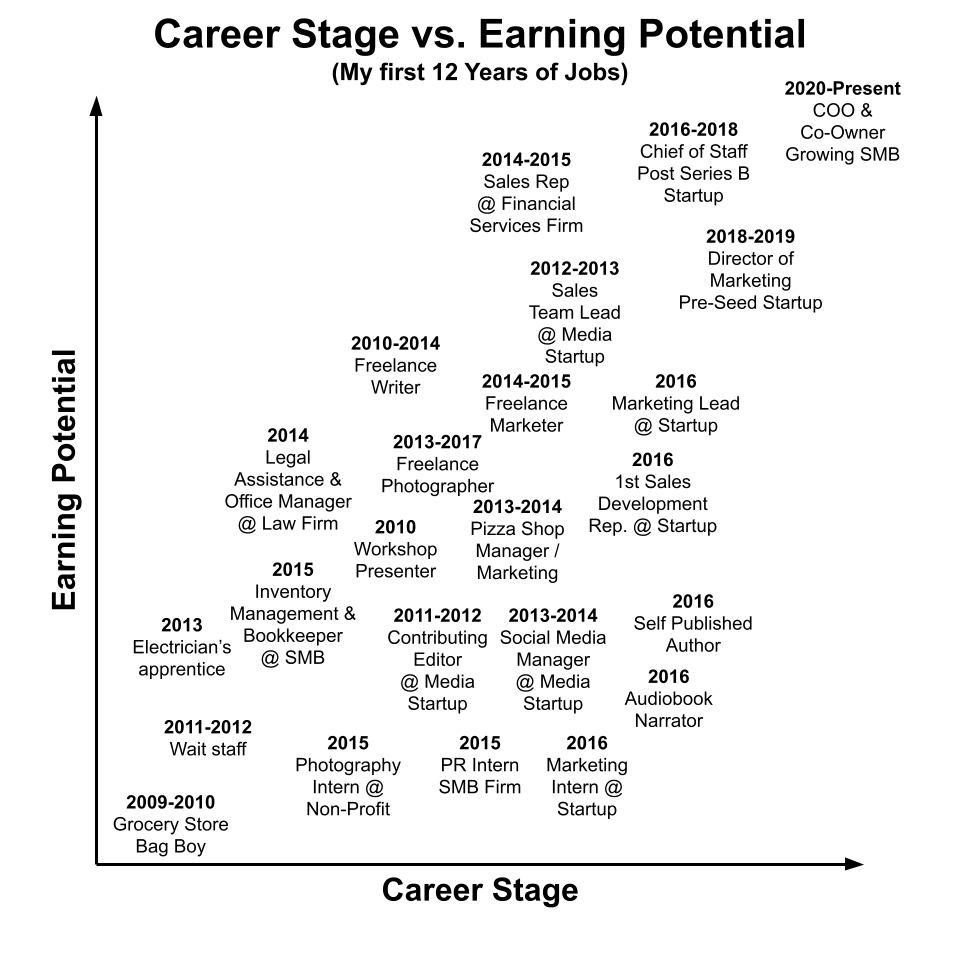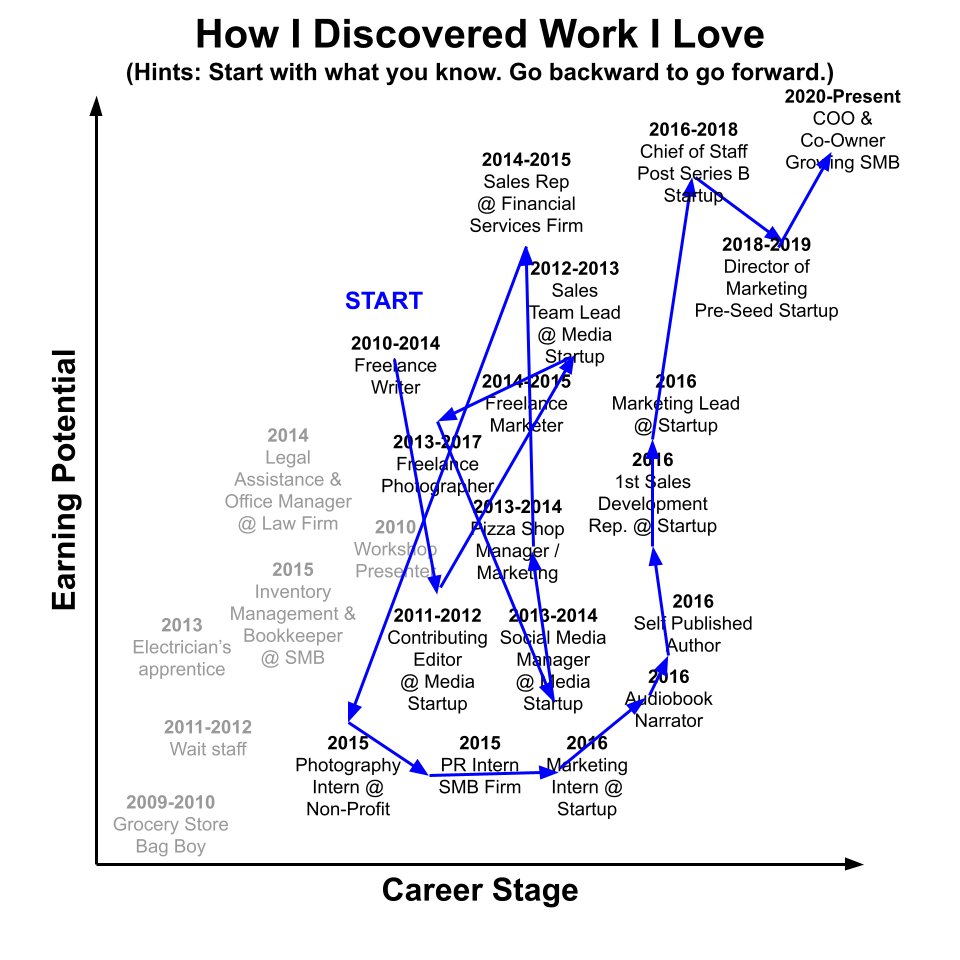Several years ago I reached all the goals I’d been aiming for professionally (at the time).
I’d climbed to the highest possible rank in the company for my respective skillset – a company whose mission I believed in. I had autonomy to choose which big problems to work on in the business. I was making great money. I’d gained respect and confidence and a robust skillset.
In other words, I had achieved everything I thought I’d been working to accomplish.
Still, something felt off.
In spite of reaching what felt like the pinnacle of my career, I encountered a surprising feeling.
It was not happiness. It was not excitement. Nor pride. Nor contentment. But boredom.
The feeling surprised me. I thought once I achieved my goals everything would sort itself out. Like the attainment of my goals warranted some kind of enlightenment.
But instead I found myself questioning everything about my station in life.
Should I leave my “dream job” to venture out on my own?
Should I find a new job?
Is it possible to reignite the fire I felt while I was working toward my goals?
Am I in the right place?
Does this make me ungrateful?
Am I missing something?
And on and on the second-guessing and uncertainty was overwhelming.
Because I needed to have certainty. I craved it. Still, I found myself staring down a path obscured by fog.
In the months and years that followed I would learn several big lessons about facing down uncertainty, boredom, ambition and professional angst.
I’ll spare you all the gory details of that journey and instead just get to the hard-earned advice.
If you’ve ever felt uncertainty about what to do next in your career, or uncertainty as a byproduct of boredom, or professional angst springing from impatience…then these tips might hit home with you.
How to Stare Down Uncertainty, Boredom, and Professional Angst
1. Don’t look to your job to satisfy every dimension of your curiosity.
If you’re relying on your job to provide all of your personal and professional development, then you’re doing it wrong.
We’re all multi-dimensional individuals with ranges of curiosities that would be impossible to satisfy through a single job. Find a way to prioritize your own interests beyond your day-job. Lean into those interests. Cultivate your creatives capacities outside the office.
Reserve a part of you just for yourself and your own passions. This will recharge you; offer you a cathartic outlet; and make you an overall more interesting, well-rounded person.
2. Aim for clarity, then challenge.
Before you know what you want to do, it’s okay to go into information-gathering mode. I called this “Your Quest for Clarity.”
Try stuff. Eliminate options that don’t seem interesting. Then double-down on the skills / career path / interests that really light your fire. Mainly, don’t do stuff you hate.
If you iterate enough, worst case you’ll find something tolerable and best case you’ll find something that excites the hell out of you – anywhere in between those two poles is still a win. But a word of caution – not long after you “find your thing” you’ll eventually get good enough that the job becomes easy. This is a danger zone.
Continue to seek out challenges that will force you to grow and develop (even if they are outside your job). When things get too easy, it’s an early warning sign of impending stagnation.
3. Don’t burn down everything you’ve built on an impulse.
It can feel exciting to think about exiting a situation in the name of adventure. You could leave it all behind today to go chasing some other big hairy audacious goal. Maybe you’ll start your own thing. Or land an awesome new job at another cool company, and then everything will be great!
Sadly, the new adventure will probably lead you to the same spot you’re in eventually. Because the truth is, sometimes you will feel bored in your career. We live in a world of in-your-face instant gratification. There’s always a new shiny object that seems like a better path.
Patience and focus can be superpowers in your life and career. If you can find a way to trudge through the boredom, and still do your best work in the meantime, you’ll unlock the true power of uninterrupted compound interest in your career. Which means more options, not fewer. Don’t leave a job you don’t hate just because you think there may be some hypothetical better option out there. The situation you’re in may offer you more upside than you realize.
4. Give yourself permission to daydream about your options
When you find yourself unsure about what to do next, or bored in your current situation, allow your imagination to go to work. Keep a journal of ideas. Daydream. Allow your creative capacities to run wild.
It’s okay to explore those options mentally. It can offer a release. But the brainstorming time can also lead to actual tangible developments – which can take time, energy, and focus. It’s rarely immediately obvious what steps you should take next. Give yourself some room to visualize the multiple future possibilities.
5. Target universally good actions.
While you’re in the “ugly in-between” of boredom or uncertainty, there are still positive steps you can take to build momentum.
First, you can take universally-good actions. Like saving money, paying off or paying down debt. Expanding your network. Building an audience. Creating content around your areas of interest. Writing regularly and publishing your work. Etc. The list goes on and on.
But these kinds of positive actions will expand your option set as you gain clarity; and ultimately make it easier for you to say yes once you figure out your next step.
These are just a few suggestions from my own lived experience dealing with uncertainty, professional angst, and boredom.
You owe it to yourself to take your personal and professional development into your own hands. Don’t settle for a life that bores you. Channel your energy into your own interests and creative capacities.
Keep iterating and working hard. Even when you may not know where it’s leading.
Eventually, those positive behaviors will lead you to a place of more clarity than you have today.

